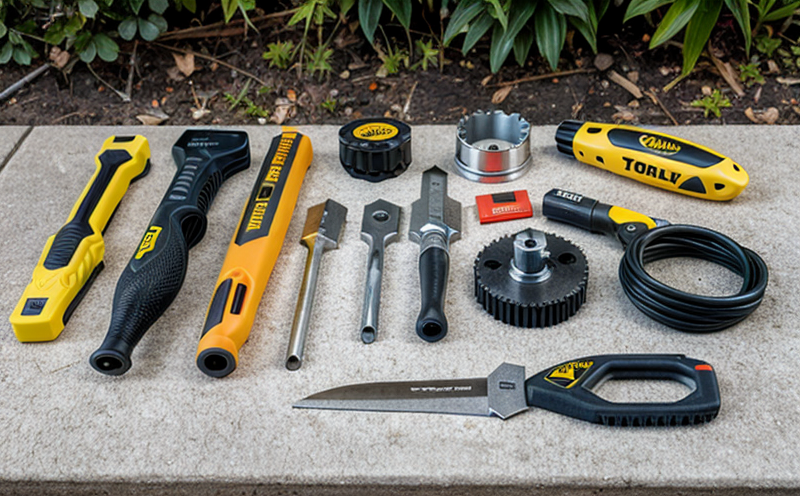Electrical Safety Testing of Power Tools
The electrical safety testing of power tools is a critical component in ensuring product compliance with international standards and safeguarding end-users. This service focuses on the rigorous evaluation of power tools to identify potential hazards, such as short circuits, overloads, or insulation breakdowns that could lead to electric shock or fire risks.
Our team performs a comprehensive suite of tests that include insulation resistance testing, dielectric strength testing, ground fault protection evaluation, and surge voltage testing. These tests are conducted using state-of-the-art equipment calibrated to meet the requirements of international standards such as ISO, ASTM, and IEC.
For instance, in insulation resistance testing, we measure the resistance between the energized parts and the exposed conductive parts or accessible non-conductive surfaces. This helps to determine if the tool's insulation is adequate to prevent electrical leakage. The dielectric strength test checks whether the tool’s components can withstand a specified voltage without causing a breakdown.
Ground fault protection evaluation ensures that the protective device in the power tool functions correctly under fault conditions, thereby preventing injury from electric shock. Surge voltage testing assesses how well the tool can handle transient overvoltages to prevent damage and ensure safety.
The importance of these tests cannot be overstated, especially considering the high incidence of electrical accidents related to DIY tools. Properly conducted tests not only comply with regulations but also enhance product reliability and consumer confidence. Our laboratory adheres strictly to international standards such as ISO 14054-2 for power tools, which mandates these safety measures.
In addition to the aforementioned tests, we also conduct thorough inspections of tool components, including the motor, switch, and cord, ensuring they meet stringent quality criteria. This process involves visual inspection as well as functional testing to ensure all parts operate correctly under expected conditions.
Our team uses advanced instrumentation that provides precise measurements and real-time data analysis, allowing us to detect even minute flaws that could compromise safety. We provide detailed reports outlining the results of each test, along with recommendations for improvements if necessary. This service is particularly valuable for quality managers, compliance officers, R&D engineers, and procurement professionals who are responsible for ensuring product safety and regulatory compliance.
By partnering with our laboratory, businesses can rest assured that their power tools meet the highest standards of electrical safety. Our commitment to accuracy and precision ensures that every tool we test is safe for use in any environment, enhancing both the reputation of the manufacturer and user safety.
Industry Applications
The electrical safety testing of power tools finds applications across various industries where DIY tools are used. These include construction, home improvement, automotive workshops, and manufacturing facilities. In the construction sector, ensuring that power tools comply with safety standards is crucial given the high-risk nature of the work.
- Construction sites require reliable tools that can withstand harsh environments without compromising on safety.
- In home improvement projects, where DIY enthusiasts use these tools frequently, it’s essential to guarantee their reliability and safety.
- Automotive workshops benefit from tools that are not only powerful but also safe for prolonged use. Regular testing ensures continuous compliance with industry norms.
The automotive sector particularly values tools that can handle high torque loads without overheating or causing electrical hazards. Our testing ensures these tools meet the stringent requirements set by international standards such as ISO 10436 and ASTM F1758.
In manufacturing facilities, where tools are used for repetitive tasks, safety is paramount. Our tests help manufacturers ensure that their products not only perform well but also meet all regulatory requirements.
International Acceptance and Recognition
The electrical safety testing of power tools enjoys widespread acceptance across numerous countries, making it a globally recognized service. This is due to the increasing emphasis on product safety and compliance with international standards.
Many countries have adopted ISO 14054-2 as part of their national regulations for electrical appliances. Compliance with this standard ensures that power tools can be sold in multiple markets without additional testing.
The United States, under the National Electrical Code (NEC), requires that all electrical products meet certain safety criteria. Our tests align perfectly with these requirements, ensuring seamless market entry into the American market.
European Union directives also mandate stringent safety standards for electrical appliances. By adhering to our comprehensive testing regimen, manufacturers can easily comply with EU regulations such as the Low Voltage Directive (LVD) and the Restriction of Hazardous Substances (RoHS).
In Asia, where markets like China and Japan have strict quality controls, compliance with international standards is essential for export. Our laboratory’s certification ensures that power tools meet these rigorous requirements.
Competitive Advantage and Market Impact
The electrical safety testing of power tools offers significant competitive advantages to businesses in the DIY tool sector. By ensuring product compliance with international standards, manufacturers can differentiate themselves from competitors who may not meet these requirements.
Firstly, it enhances brand reputation by demonstrating a commitment to quality and user safety.
Secondly, it facilitates easier market access in countries with strict regulatory environments.
A compliant product is less likely to face recalls or legal challenges, reducing the risk of negative publicity. This can lead to increased customer trust and loyalty, which in turn boosts sales and market share. For R&D engineers, our service provides a valuable resource for developing innovative yet safe products that meet global standards.
Compliance also opens up new export opportunities, allowing manufacturers to tap into international markets. This expansion of the product range can significantly impact revenue growth and overall business performance. In summary, electrical safety testing is not just a regulatory requirement but a strategic advantage in today’s competitive market landscape.





